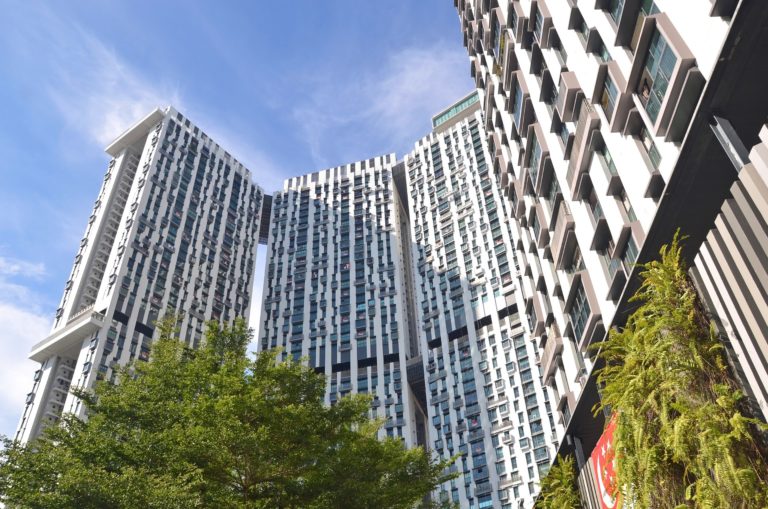All we see is a tiny model, an artist’s impression, and yet we get to put money down, sign a few contracts, and a few years later own an actual property.
Sometimes we’ll see a beautifully decorated show flat, and sometimes we’re just going on line drawings and imagination.
This post looks at private residential and commercial properties.
Residential first.
Completed versus uncompleted properties
Where a completed property is “caveat emptor” — let the buyer beware (and so be responsible in looking at everything) and an old lease — a property under construction has a 12-month defect liability period and a fresh leasehold term.
There’s a higher price per square feet, and a purchase price adjustment if the completed property is more than 3% smaller than stipulated in the sale agreement.
The process is different. Uncompleted properties [vs completed properties]:
- Option to Purchase (OTP) and Sale and Purchase Agreement (S&P)
- prescribed [vs owners setting terms]
- Option not assignable [vs possible]
- 5-10% option fee [vs 1%], usually 5%
- three weeks to exercise option [vs two weeks]
- Forfeit 25% of option fee — 25% of 5-10% [vs option fee, the whole 1%]
- 15% to exercise option (5% + 15% = 20%) [vs 4% for 5%]
- S&P = contract [vs buyer exercising option]
- Legal completion date in S&P [vs 10-12 weeks]
- Forfeit 20% — the whole 20% [vs no withdrawal once contract signed]
- 10 stages of payment [vs three]
- controlled by Housing Developers (Control & Licensing) Act [vs nope]
- marketed only with
- Developer’s Licence
- Building Plan
- filing of Share Value with Commissioner of Building (strata titled properties)
- [vs market any time]
- Register of Booking [vs none]
[Note: hang on, the payment timeline here isn’t the same as the timeline I learned now that I have my licence. I’ll need to double check this, private new launch timeline. The 15% payment can happen at either the exercising of S&P or the completion date.]
Housing Developers (Control & Licencing) Act
Housing developer:
- people, group, society, company
- building accommodation of more than four units
Housing developer’s licence must be obtained, before construction, from the Controller of Housing for:
- housing project of more than four units
- mixed resi/comm of more than four units
- for people or business
- addition and alteration work to existing resi building resulting in increase in units or gross floor area
- providing money to a project of more than four units and is not a bank or MAS-licensed finance company
- to construct or cause to construct
Types of Licence
“Sale” licence allows developer to sell units, after obtaining Building Plan approval.
“No-Sale” licence allows construction, and to sell only after obtaining Temporary Occupation Permit and an approval to convert licence to “Sale” licence.
The requirements for applying a developer’s license depend on:
- number of units –> minimum paid-up capital/deposit
- under 50 units, $1 million
- …
- more than 400 units, $4 million
- size of applicant’s projects in five years –> size of current project
- under 10 units –> under 50 units
- …
- over 100 units –> no restriction
Licence fee depends on number of units.
Licenced Developer Duties
To open and maintain a Project Account to hold purchaser’s monies and construction loan. Pays:
- property tax on land
- stamp duty
- legal fees
- insurance
- fees for architect, engineer, surveyors, consultants
- construction
- electricity and water
Appoint an auditor, to publish accounts, to inform the Controller of any changes.
Developers are required to provide to potential buyers (before accepting booking fee):
- plans drawn to scale
- strata properties: floor area
- specifications of unit
- finishes of wall and floor
- conditions (remember this? conditions like terms and conditions) and restrictions from authorities
- amendments to S&P
- past projects completed
- benefits offered
Salesperson Duties
Convery accurate information on:
- transaction price
- direct and indirect benefits
- payment rebate, absorption of legal/stamp fees, rental guarantees, reimbursement, allowance, discount, voucher…
- maintain detailed record of benefits
- breakdown of monetary values, dates, prices
Advertisements
Must contain:
- developer name and licence number
- tenure and encumbrances
- dates of vacant possession and conveyance of legal titles to purchasers
- location, lot number, Mukim/Town Subdivision
Cannot contain any connection to president, government, false/misleading claim.
Use “pending approval for sale” / “seeking indication of interest” when approval has not been obtained.
Cannot use the terms “New Launch”, “Sales Team/Hotline”. (huh.)
Option to Purchase
Unless inside the list of pre-approved amendments, or with approval form the Controller of Housing, developers cannot change the OTP (no buyer-developer agreements).
Standard Option to Purchase agreements include:
- developer name, licence number, project account bank
- buyer name
- option expiry date
- description of property
- address, tenure
- purchase price, payments required, refunds
- special conditions
- benefits offered
- developer-authorised signature
Options cannot be assigned — any change of name requires Controller’s approval.
5-10% of purchase price as the booking fee.
- Forfeit 25% of booking fee if OTP expires, balance 75% returned within four weeks.
Three weeks — the validity of the option — during which:
Sale and Purchase Agreement
- within 14 days of the OTP, the developer’s law firm has to deliver
- Sale and Purchase agreement and
- title deed
- to buyer’s lawyer firm
- within three weeks, the buyer exercises the S&P
- signs all copies of the Sale and Purchase agreement
- returns all copies to developer
- pays balance down payment
- a total of 20% of purchase price (minus the booking fee)
- developer may allow eight weeks for payment.
Unless already permitted, or with prior approval from Controller in writing, the S&P cannot be amended.
[Note for practicing RES: within two weeks, buyer has to pay Stamp Duty. By CPF or cash top-up. The completion comes after as set in the S&P.]
Register of Bookings
Lists:
- developer’s licence number
- buyer’s name, address, IC/passport number,
- new address, land/floor area
- purchase price
- option date, fee paid
- dates
- S&P and title deeds delivered to buyer
- expiry of option
- money refunded
- refund cheque number
- remarks
After the S&P
Sub-sale — After signing the S&P, a buyer can request the developer to enter into a new S&P with a sub-purchaser.
Repudiation of contract — to reject/refuse to recognise/pay:
- instalments unpaid 14 days after due,
- non-payment of progress payment after Certificate of Statutory Completion is issued.
Unpaid instalments:
- Within 14 days:
- developers charge 2% interest above basic rate set by local banks
- Developer gives buyer 21 days’ notice.
- If unpaid for more than 14 days, the S&P has been repudiated by buyer
- developer can
- annul the S&P,
- forfeit 20% of purchase price,
- recover outstanding interest,
- resell unit.
Progress payments
- 5-10% (booking fee) — OTP, usually 5%
- 20% minus booking fee — S&P or eight weeks from option date, usually 15%
- 10% —
- foundation
- reinforced concrete
- 5% —
- brick walls
- ceiling
- wiring, plastering, plumbing, door, window
- carpark, roads, drains
- Temporary Occupation Permit (TOP) is issued
- 25% — notice of vacant possession
- 15% — completion date
- If Certificate of Statutory Completion (CSC) hasn’t been issued:
- 2% to developer
- 8% minus deductions — within seven days of CSC
- 5% minus deductions — 12 months after notice of vacant possession
- If CSC is issued
- 2% to developer
- 8% — within 14 days of CSC
- 5% to Singapore Academy of Law — released 12 months after notice of vacant possession
- If Certificate of Statutory Completion (CSC) hasn’t been issued:
The Singapore Academy of Law is stakeholder for funds during the 12-month Defects Liability period, in case the developers refuse to make good the defects.
Notice of Vacant Possession
Delivered by
- date in S&P,
- 21 days from
- buyer paying 25% of purchase price
- due when TOP is issued
- roads, drains, sewerage completed.
Liquidated damages if developer fails to deliver vacant possession by these dates.
Breach remedies
Defects liability period — for 12 months after Notice of Vacant Possession, the developer must make good any defect within one month from receiving notice from the buyer.
If the developer doesn’t, the buyer can:
- get an estimated cost,
- giving the developer another 14 days to rectify the defect
- carry out the rectification and recover the cost from the Singapore Academy of Law.
Liquidated damages are calculated on a daily basis, at 10% per annum on the instalments paid, from the transfer date until the Notice of Vacant Possession is received.
Shortfall — if the area is more than 3% smaller than agreed upon, there is an adjustment to the purchase price.
- A reduction of
- $PurchasePrice /
- (square metre of deficiency
- more than 3%)
(The property has to be more than 3% smaller, and the reduction to purchase price is at the 4th percent onwards.)
Share value
determines maintenance charges payable.
Commercial properties
Commercial Properties Act regulates the sale of units in
commercial properties of more than four units. Includes:
- industrial
- warehouse
- showroom
- excludes
- non-resi with four or fewer units,
- non-resi with Certificate of Statutory Completion (CSC) and Subsidiary Certificate of Title issued.
Differences and similarities to the sale of uncompleted residential properties…
- No licence needed, sell after obtaining Building Plan approval
- [vs “Sale” and “No-Sale” License in resi]
- No Project Account (but usually they will have one)
- No advertisement rules
- Prescribed OTP and S&P
- no amendments, option not assignable
- sub-sale allowed
- charge sub-purchaser $400 in admin fee and for new S&P
- Unpaid instalments and repudiation of contract (same)
- instalments unpaid 14 days, charge 2% interest above basic rate set by local banks
- developer gives buyer 21 days’ notice,
- the S&P has been repudiated by buyer
- developer can
- annul the S&P,
- forfeit 20% of purchase price,
- resell the unit.
- Notice of Vacant Possession and Temporary Occupation Permit
- by transfer date or pay liquidated damages of 10% per annum on instalments paid.
- Legal completion
- Notice to Complete must be issued three years after Notice of Vacant Possession or date in agreement, whichever earlier.
- within 14 days, deliver duplicate Subsidiary Strata Certificate of Title for unit.
- Different, defect, shortfall
- if final approved building plans differ substantially from plans in agreement,
- purchaser terminate agreement
- refund of all monies plus interest at 10% per annum
- 12 month defect liability period (same)
- Excess of 3% of area leads to purchase price adjustment (same)
Progress payments:
- 0-10% booking fee — OTP
- notice the 0% — can have the option with no payment
- [vs 5-10% resi]
- Forfeit 50% booking fee if OTP expires
- [vs 25% in resi]
- 20% minus booking fee — S&P
- all 20% then, since booking fee can be 0%
- 10% —
- foundation
- reinforced concrete
- 5% —
- brick walls
- ceiling
- wiring, plastering, plumbing, door, window
- sanitary and electrical, air-con plant [extra point here, none for resi]
- carpark, roads, drains
- 25% — Notice of Vacant Possession and Temporary Occupation Permit
- 10% — completion date
- If Certificate of Statutory Completion (CSC) is issued before completion of sale (legal completion):
- 2% to developer
- 8% — upon completion of sale
- If CSC is issued after completion of sale (legal completion):
- 2% to developer
- 8% to Singapore Academy of Law — released when CSC is issued
- [in resi,
- 2 to developer,
- 8 seven to 14 days after CSC,
- 5 to Singapore Academy of Law]
- If Certificate of Statutory Completion (CSC) is issued before completion of sale (legal completion):
❤️🌧️
Image of gingerbread houses on cake by HebiPic from Pixabay.
(They look like a selection of uncompleted properties.)





